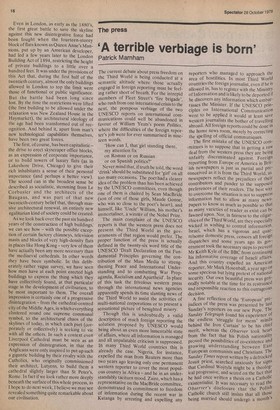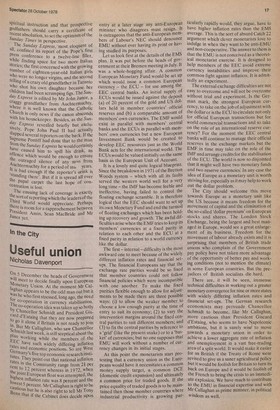The press
'A terrible verbiage is born'
Patrick Marnham
The current debate about press freedom on the Third World is being conducted at a semantic altitude where those actually engaged in foreign reporting must be feeling rather short of breath. For the intrepid members of Fleet Street's 'fire brigade', who rush from one international crisis to the next, the pompous verbiage of the two UNESCO reports on international communications could well be abandoned in favour of William Yeats's poem Politics, where the difficulties of the foreign reporter's job were for ever summarised in nineteen words.
'How can I, that `girl standing there, my attention fix on Roman or on Russian or on Spanish politics?'
Never mind that, if truth be told, the word 'drink' should be substituted for 'girl' on all too many occasions. The poet had a clearer idea of the problem than has been achieved by the UNESCO committees, even though one of them is chaired by Sean MacBride (son of one of those girls, Maude Gonne, who was so close to the poet's heart), and himself, like 'Uncle' William, his mother's immortaliser, a winnbr of the Nobel Prize.
The main complaint of the UNESCO reports is that the western press does not present the Third World as the governments of that region would prefer. The proper function of the press is actually defined in the twenty-six word title of the UNESCO 'Draft Declaration on the Fundamental Principles governing the contribution of the Mass Media to strengthening Peace and International Under standing and to combatting War Propaganda, Racialism and Apartheid'. In place of this task the frivolous western press through the international news agencies apparently spends its time slanting news of the Third World to assist the activities of multi-national corporations or to present a sensational picture of benighted misery.
Though this is undoubtedly a valid description of much foreign reporting the solution proposed by UNESCO would bring about an even more lamentable state of affairs, where all information is managed and all unpalatable criticism is suppressed.
In many Third World countries this is already the case. Nigeria, for instance, expelled the man from Reuters more than two years ago leaving only one permanent western reporter to cover the most popul ous country in Africa — and he in an under standably taciturn mood. Zaire, which has a representative on the MacBride committee, demonstrated its commitment to freedom of information during the recent war in Katanga by arresting and expelling any reporters who managed to approach the area of hostilities. In most Third World countries the foreign journalist, even if he is allowed in, has to register with the Ministry of Information and is likely to be deported if he discovers any information which embarrasses the Minister. If the UNESCO principles on International Communication were to be applied it would at least save western journalists the bother of travelling abroad. All foreign reports could be done in the home news room, merely by correcting the spelling of official communiques.
The first mistake of the UNESCO corn.mittees is to suppose that in getting a raw deal from the western press they are being unfairly discriminated against. Foreign reporting from Europe or America in British newspapers is just as partial and preconceived as it is from the Third World, as newspapers reflect the prejudices of their contributors and pander to the supposed preferences of their readers. The best way to overcome the situation is not to suppress information but to allow as many newspapers to know as much as possible so that as many varieties of reader as exist can be fawned upon. Nor, in fairness to the oligarchies of the Third World, are they especiallY wicked in wishing to control information. Israel, which has a vigorous and quarrelsome domestic press, censors all foreign dispatches and some years ago its government took the necessary steps to prevent Mr Keith Kyle of the BBC from continuing his informative coverage of Israeli affairs. And this country expelled an American reporter, Mr Mark Hosenball, a year ago orl some specious but lying pretext of national security. Our own beautiful press was generally notable at the time for its restrained and responsible reaction to this outrageous decision.
A fine reflection of the 'European' preindices of the press was presented by last Sunday's reporters on our new Pope. The Sunday Telegraph found his experience of the endless 'struggle for mens' minds behind the Iron Curtain' to be his chief merit, whereas the Observer took heart from the fact that his Polish nationality proved the possibilities of co-existence and growing understanding between East European communists and Christians. The Sunday Times report written by a defrocked Jesuit priest, searched anxiously for signs that Cardinal Wojtyla might be a theolog ical progressive, and seized on the fact that he had once written a thesis on a Cathohe existentialist. It was necessary to read the Observer's disclosure that the Polish Catholic church still insists that all those being married should undergo a month s spiritual instruction and that prospective godfathers should carry a certificate of recent absolution, to set the optimism of the Sunday Times in perspective. The Sunday Express, most eloquent of all, confined its report of the Pope's first press conference to a twelve-line filler, While finding space for two more Italian stories; the first concerned with the growing number of eighteen-year-old Italian girls who were no longer virgins, and the second telling Of a crazy old grandfather in Taranto who shot his own daughter because her children had been scrumping figs. The Sunday Express is edited by Mr John Junor, a craggy grandfather from Auchtermuchty, Where it is well known that the Catholic Church is only news if the canon absconds with his housekeeper. Besides, as the Sunda), Express revealed briefly but exclusively, Pope John Paul II had actually slapped several reporters on the back. If the Supreme Pontiff had done that to the man from the Sunday Expre ss he would certainly have caused him to spill his drink, an offence which would be enough to ensure the outraged silence of any niqn from Auchtermuchty for a period of ma, Years. it is bad enough if the reporter's urink is 'standing there'. But if it is spread all over the papal carpet the last hope of concentration is lost. The ensuing lack of coverage is exactly the sort of reporting which the leaders of the Third World would appreciate. Perhaps there is room for a rapprochement between President Amin, Sean MacBride and Mr Jurior yet.







































 Previous page
Previous page